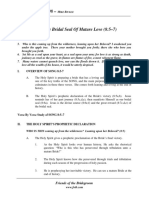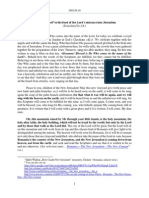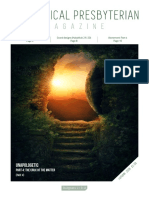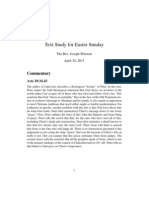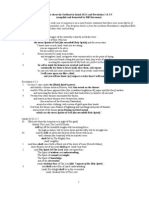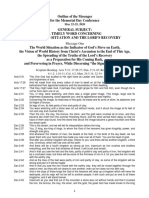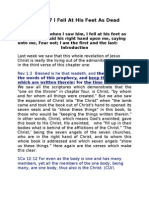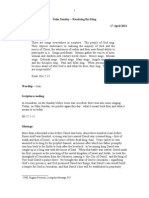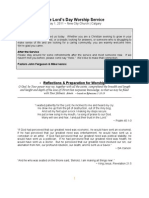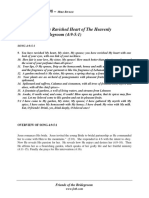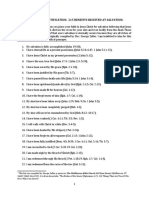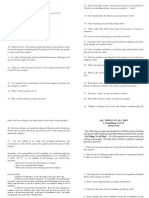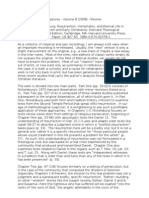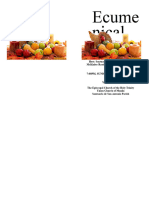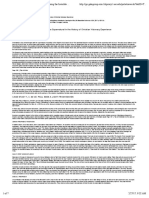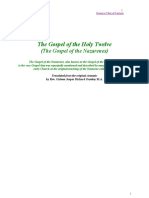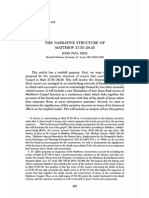Sos Notes Session 10
Uploaded by
eliastemer6528Sos Notes Session 10
Uploaded by
eliastemer6528SONG OF SONGS – MIKE BICKLE
SESSION 10: A Revelation of Jesus as a “Safe Savior”
(3:6-11)
SONG 3:6-11
6. Who is this coming out of the wilderness like pillars of smoke, perfumed with myrrh and
frankincense, with all the merchant's fragrant powders?
7. Behold, it is Solomon's couch, with sixty valiant men around it, of the valiant of Israel.
8. They all hold swords, being expert in war. Every man has his sword on his thigh because of
fear in the night.
9. Of the wood of Lebanon Solomon the King made Himself a palanquin:
10. He made its pillars of silver, its support of gold, its seat of purple; its interior paved with
love by the daughters of Jerusalem.
11. Go forth, O daughters of Zion, and see King Solomon with the crown with which His
mother crowned Him on the day of His wedding, the day of the gladness of His heart.
I. OVERVIEW OF SONG 3:6-11
A. This is the fourth revelation of Jesus in the SONG. In this section, she teaches the
daughters of Jerusalem her new discoveries of the safe leadership of Christ (3:6-
10). Jesus’ incarnation and death prove that He has our good in mind.
B. The Holy Spirit asks a rhetorical question, then He gives a 2-part answer. She
communicates this 2-part answer to the daughters of Jerusalem.
1. The first answer is seen in 3:7-8. The Holy Spirit uses military language to
reveal how safe the people of God are under Jesus’ leadership.
2. Her second answer is seen in 3:9-10. Here the Holy Spirit uses the
language of a royal procession to again reveal how safe the people of God
are under Jesus’ leadership.
Friends of the Bridegroom
www.fotb.com
SONG OF SONGS – MIKE BICKLE
SESSION 10: A Fresh Revelation Of Jesus – a Safe Savior Page 2
C. She exhorts the daughters to press into Jesus in light of His glorious redemption
and excellent leadership (3:11).
1. This is her first dialogue with members of the body since 1:6. Her
personal experience from SONG 1:7 to 3:3 has been only with the Lo rd.
2. She received the revelation of Jesus’ safe leadership when she “held on” to
Him (3:4). The Lord removed fear from her heart in the context of her
rising up in obedience to be involved in the purpose of God (3:2). She is
now taking the risk of ministering to others as she rose from her bed to
minister in the city.
D. Jesus is being revealed to her as a “safe Savior”. The only safe place for our
hearts is in the context of 100% obedience. She reveals the fruit of her discovery
in this section to the daughters of Jerusalem. She sees Jesus as the “safe savior”
that provides her safety on her journey through the wilderness.
1. The promise of safety focuses primarily on spiritual safety that protects
our hearts.
2. In a secondary way, it speaks of protecting us physically and in terms of
our earthly circumstances.
E. This section proves to be a significant revelation that prepares her for the great
turning place in her commitment in 4:6-16. She believes that her heart will be
safe so she is no longer afraid of leaving the comfort zone. She knows that
obedience will bring life and not death. The depth of commitment she manifests
in chapters 4-8 flows out of this new insight into the Lord’s safe leadership.
F. Many of the earthly authority figures in our life have not been safe. The enemy
lies to us continually about Jesus our ultimate authority figure. We can only see
Him as safe from the point of view of eternity. He is omniscient. He sees the end
from the beginning and so He knows how to lead us. This is difficult to grasp, but
it is the key to understanding what is on His mind.
Friends of the Bridegroom
www.fotb.com
SONG OF SONGS – MIKE BICKLE
SESSION 10: A Fresh Revelation Of Jesus – a Safe Savior Page 3
II. THE HOLY SPIRIT ASKS A QUESTION
Who is this coming out of the wilderness like pillars of smoke, perfumed with myrrh
and frankincense, with all the merchant’s fragrant powders? (3:6).
A. The ascension of Jesus after His incarnation and crucifixion is being presented by
the Holy Spirit to grant assurance to the young Bride.
“WHO IS THIS” coming out of the wilderness (3:6a).
B. This is a question being asked by the Holy Spirit to highlight the drama of Jesus'
return to the eternal city. It is a rhetorical question in which the answer is
obvious.
1. The question is answered in two different ways 3:7-8 and 3:9-10.
2. The Holy Spirit asks the rhetorical question. Then, she proclaims to the
daughters her new discoveries of Jesus’ safe leadership. She discovers the
excellence of His leadership. He is not negligent in any of His leadership.
He is a triumphant king that uses great wisdom and power.
C. King David asked a similar question with the same intent to draw us into the
beauty, drama, and pageantry of Jesus' return to heaven.
Lift up your heads, O you gates! And be lifted up, you everlasting doors! And
the King of glory shall come in. Who is this King of glory? The LORD strong
and mighty, the LORD mighty in battle. (Ps. 24:7-8)
D. The necessity of the wilderness in God's plan for the Bridegroom and the Bride.
Who is this coming out of “THE WILDERNESS” like pillars of smoke…? (3:6)
1. The wilderness can speak of several things.
a. The wilderness speaks of life in this fallen age. Israel’s 40- year
journey through the wilderness is a picture of our struggle in a fallen
world, on our way to the Promised Land filled with the glory of God.
b. The wilderness speaks of difficult times of intense testing.
c. The wilderness speaks of a time of failure and sin, the time where sin
and the flesh wage war.
Friends of the Bridegroom
www.fotb.com
SONG OF SONGS – MIKE BICKLE
SESSION 10: A Fresh Revelation Of Jesus – a Safe Savior Page 4
d. The wilderness speaks of a season of spiritual warfare against Satan.
e. The wilderness speaks of the place of encounter with God. Jesus and
John the Baptist both had encounters with God in the wilderness.
2. Jesus was driven by the Holy Spirit to an actual desert wilderness to be
tested for 40 days.
a. Jesus spent 33 years on the earth in the wilderness of this fallen world.
He laid aside the form of God and He took upon Himself the form of
creation. He leaves the eternal city to descend into a depressed, sin-
ridden world filled with demons and oppression. This world was a
wilderness for Him. He possessed such holy sensitivity during his
earthly journey. He surely felt so much happening in the Spirit. We
talk about people who are very sensitive in the Spirit and they feel the
burdens and oppressions. He walked for 33 years in perfect
sensitivity. When the Holy Spirit rested on Him His sensitivity was
heightened.
b. Jesus spent 40 days in the desert fasting in the wilderness as He
encountered the Father. Jesus was driven by the Holy Spirit to an
actual desert wilderness to be tested and to qualify as the High Priest
who could make propitiation for sin (Heb. 2:17; Matt. 4:1-11).
c. Jesus knew the wilderness of testing in the garden of Gethsemane and
the cross.
E. Jesus' victory over the wilderness.
Who is this “COMING OUT OF” the wilderness like pillars of smoke…? (3:6).
1. Jesus ascended back to the Father in total victory in the resurrection, re-
entering the celestial glory of the eternal city. The host of heaven
witnessed Jesus coming up out of the wilderness of this fallen world after
the resurrection as He took His position at the throne of glory at the
Father’s right hand
2. The angels watched Jesus in the resurrection. He is described as coming
out of this fallen world to reenter the celestial glory of the eternal city. As
Jesus was coming, the host of heaven or the Spirit of God could have said,
“Who is this coming forth from the wilderness, coming out of this fallen
and dark world”?
3. Jesus returns to the ivory palaces in the eternal city.
Friends of the Bridegroom
www.fotb.com
SONG OF SONGS – MIKE BICKLE
SESSION 10: A Fresh Revelation Of Jesus – a Safe Savior Page 5
All Your garments are scented with myrrh and aloes and cassia, out of
the ivory palaces, by which they have made You glad. (Ps. 45:8)
a. Ps. 45 is sub-titled “the Song of Love”. It is the Psalm written in the
language of the Song of Solomon.
b. Jesus is being pictured as “coming out of” the ivory palaces, as He
descended in the incarnation.
c. These ivory palaces speak of His life as God in eternity past, in heaven
or the eternal city.
d. Jesus descended from the ivory palace to dwell in the form of man in
the wilderness of a fallen world. In the ivory palaces, His clothes were
scented with the rare fragrance of the ivory palaces. When Jesus left
the throne of God, He came to earth as a fragrant filled man.
e. He ascends back to the place scented with heavenly fragrances. In
SONG 8:14, heaven is called the mountain of spices.
4. Jesus comes up out of the wilderness victoriously in 3:6. Jesus’ victory
over this fallen world makes Him a sympathetic high priest who
understands our temptations.
For we do not have a High Priest who cannot sympathize with our
weaknesses, but was in all points tempted as we are, yet without sin.
(Heb 4:15)
a. He feels our pain because He had to come up out of the wilderness.
Jesus is described in scripture as possessing a unique dimension of
sympathy that neither the angels nor the Father are described as
possessing. The Father’s compassion and mercy is not the same thing
as Jesus’ human sympathy. In His humanity Jesus is not ashamed of
His weak and sinful brethren.
…He is not ashamed to call them brethren…(Heb 2:11)
b. He doesn’t stand at a distance, commanding us to come up to Him. He
experienced human life in this fallen wilderness. He knows what we
are going through in our quest to come out of the wilderness
victoriously.
Friends of the Bridegroom
www.fotb.com
SONG OF SONGS – MIKE BICKLE
SESSION 10: A Fresh Revelation Of Jesus – a Safe Savior Page 6
c. This uniquely qualifies Him to bring us to a place of safety because He
understands the perilous journey. He too has traveled through the
wilderness.
d. He came up out of the wilderness in victory. Therefore we do not
have to fear. He is revealing Himself to her as the One that she does
not need to be afraid to obey. We are yoked to the One who
conquered the wilderness. Therefore, we will conquer the wilderness
with Him.
5. The same question is asked in 2 different places in the SONG (3:6, 8:5).
Who is this coming up from the wilderness, leaning upon her beloved?
(SONG 8:5)
a. The first one, Jesus is coming out of the wilderness victorious. Then,
at the end of her journey, she comes up out of the wilderness
victorious.
b. The Bride comes up victorious from the wilderness in like manner to
Jesus. Her victory in 8:5 is a reflection of His victory here in 3:6.
F. Jesus ascends to heaven in the glory of God.
Who is this coming out of the wilderness LIKE PILLARS OF SMOKE,
perfumed with myrrh and frankincense…? (3:6).
1. He is pictured as being like to pillars of smoke.
2. Smoke speaks of the glory and wonder of God.
Now Mount Sinai was completely in smoke, because the LORD
descended upon it in fire. Its smoke ascended like the smoke of a
furnace, and the whole mountain quaked greatly. (Exod 19:18)
I saw the Lord sitting on a throne…Above it stood seraphim…cried:
"Holy, holy, holy is the LORD”…and the house was filled with smoke.
(Isa 6:1-4)
Then the LORD will create above every dwelling place of Mount Zion,
and above her assemblies, a cloud and smoke by day and the shining of
a flaming fire by night. For over all the glory there will be a covering.
(Isa 4:5)
Friends of the Bridegroom
www.fotb.com
SONG OF SONGS – MIKE BICKLE
SESSION 10: A Fresh Revelation Of Jesus – a Safe Savior Page 7
"…I will pour out My Spirit on all flesh…I will show wonders in the
heavens and in the earth: blood and fire and pillars of smoke.
(Joel 2:28-30)
I will show wonders in heaven above and signs in the earth beneath:
blood and fire and vapor of smoke. (Acts 2:19)
And the smoke of the incense, with the prayers of the saints, ascended
before God from the angel's hand. (Rev 8:4)
And the priests could not enter the house of the LORD, because the
glory of the LORD had filled the LORD'S house. (2 Chronicles 7:2)
The temple was filled with smoke from the glory of God and from His
power and no one was able to enter the temple…(Rev. 15:8)
G. Smoke is a manifestation of God’s holy presence. Smoke is associated with the
fire of the Holy Spirit. This smoke speaks of the holy fire that burns within Him.
The fire of God filled Jesus, and the smoke of His zeal ascended upward as a
sweet savor to God. Smoke rose from the sacrifices that revealed the love of God.
He is filled with the pillar of smoke. He is the sacrifice made to God. The smoke
of His sacrifice is like the smoke of the sacrifice of the sacrificial system under
the priesthood. This is another way of referring to Jesus in His glory as our
sacrifice. He is ascending in the resurrection like a pillar of smoke.
1. He is clothed in the smoke of the glory of God. He ascended out of the
wilderness wrapped in heavenly garments that manifested the wonder of
God's glory.
2. She is describing Jesus as being like a pillar of smoke perfumed with
myrrh and frankincense, when He ascended out of the wilderness in
victory.
Friends of the Bridegroom
www.fotb.com
SONG OF SONGS – MIKE BICKLE
SESSION 10: A Fresh Revelation Of Jesus – a Safe Savior Page 8
H. The Fragrance of the ascended Christ
“Perfumed with myrrh and frankincense” (3:6c)
1. He is “perfumed” with two different things, “with myrrh and with
frankincense.” Myrrh speaks of Jesus’ sufferings. It is the fragrance of
His glorious death. Myrrh was a costly fragrant burial spice. It had a
double meaning: it meant death, but it also meant sweet aroma. It was
death that worked unto sweet aroma. He has accomplished the finished
work of the cross. He is perfumed with myrrh as He ascends back to God
the Father’s throne.
a. “Myrrh” is a spice used to bury the dead. He is perfumed in myrrh.
This speaks of the fragrance of Jesus’ suffering and His finished work
on the cross. When He cried, “It is finished,” the perfume of the
myrrh of God drenched Him.
b. If He suffered for her, how much more will He protect her? He is a
sympathetic high priest. He experienced the perils of the wilderness.
He is clothed in the glory of God again. He can make a difference. He
is perfumed with myrrh. He embraced the cross. He knows what the
cross is about, but He is also perfumed with frankincense.
2. Frankincense speaks of the fragrance of His intercession for the saints
(Heb.7:25). As the Jewish High Priest went into the most Holy Place with
the golden censer of frankincense or incense, so Jesus entered the Holy
Place in heaven with His glorious censer, filled with intercession.
a. The bowl of incense of Rev. 5:8 is frankincense. It speaks of the
prayers of the saints.
b. He offers to the Father His myrrh, the finished work of the cross, His
blood, and He says, “Father, I’m not just perfumed in myrrh. I’m also
perfumed in incense (which is the same frankincense). Visit my
Bride! Help her! Send the angels of God! Release your power!” He
is interceding for us night and day (Heb. 7:25).
3. When the three wise men came to Him, they came to Him with gold,
frankincense, and myrrh. They were coming to Him with three prophetic
gifts, signifying what His ministry would be like. The gold spoke of His
deity and His kingship. All three of them spoke of His life and ministry
on the earth. Some people relate them to His three offices as prophet,
priest, and king. He is perfumed with myrrh and frankincense.
Friends of the Bridegroom
www.fotb.com
SONG OF SONGS – MIKE BICKLE
SESSION 10: A Fresh Revelation Of Jesus – a Safe Savior Page 9
4. Jesus’ deeds are scented.
All Your garments are scented with myrrh and aloes and cassia, out of
the ivory palaces, by which they have made You glad. (Ps. 45:8)
a. All of Jesus' deeds were scented with myrrh. He died to His own will
to do the will of God; thus, His garments are scented with myrrh. The
Lord's desire is that our garments, our deeds, be scented with myrrh,
which again speaks of that sweetness that comes out of dying to
ourselves to do the will of God.
b. When He cried, "It is finished", the perfume of God’s myrrh drenched
Him. He was drenched in myrrh on that day when He hung on the
cross saying, "It is finished."
5. This language is consistent with the dimensions of the Old Testament
sacrificial system.
I. Jesus’ commitment to the Bride.
“With all the merchants’ fragrant powders?” (3:6d)
1. The Holy Spirit described a third aspect of His divine fragrance. He
ascended with the pillar of smoke, perfumed in myrrh and frankincense.
He also was perfumed with all the merchant's fragrant powders.
2. There are two applications in interpreting the merchant in the parables of
Jesus. He spoke of the merchant as the one that sold everything to obtain
the treasured inheritance. The merchant found a pearl and then sold
everything for this pearl.
"Again, the kingdom of heaven is like treasure hidden in a field, which
a man found and hid; and for joy over it he goes and sells all that he has
and buys that field. Again, the kingdom of heaven is like a merchant
seeking beautiful pearls, (Matt 13:44-45)
a. First, Jesus is this merchant who saw the pearl and sold all to have it.
The pearl is His Bride, which cost Him everything to purchase. He
paid the whole price, including His death upon the cross.
b. Second, we are the merchants who sell everything to follow Him. This
is a secondary way to interpret the parable of the merchant.
Friends of the Bridegroom
www.fotb.com
SONG OF SONGS – MIKE BICKLE
SESSION 10: A Fresh Revelation Of Jesus – a Safe Savior Page 10
3. The fragrant powders sold by the merchant scented the merchant with
perfume. The merchants were scented as a result of handling the
expensive powders in the marketplace. This speaks of the fragrance of
Christ to God as He embraced the cross. The fragrance of the merchant is
all over Jesus.
J. SUMMARY - Jesus did all to secure our safety. He is doing everything to bring
us into safety. He is not negligent. He is not overlooking anything. Jesus’
incarnation and death prove He has our good in mind (v. 6-7a). If He suffered for
her, how much more will He protect her in this season (Rom. 8:32)? He is a
sympathetic high priest. He knows how to get us through the wilderness. As
believers, we are protected by His work on the cross (myrrh), and His continued
intercession (frankincense), during our journey in the wilderness. The point is
that He is safe because He is the merchant who gave up everything to redeem us.
We have no need to be afraid to follow Him.
1. First He is perfumed in myrrh, the finished work of the cross.
2. Secondly, He is perfumed in frankincense. He is committed to
intercession.
3. Thirdly, He is perfumed in the merchants’ fragrant powders. He has total
resolution and commitment to us.
III. THE HOLY SPIRIT’S MINISTRY OF PROTECTION
The Holy Spirit anoints her to proclaim this message of protection to the daughters of
Jerusalem, so that they might overcome their fears. We find in Verse 11, she is speaking
to the daughters. Some versions indicate that the Holy Spirit is speaking, some indicate
that the Bride is speaking. It really doesn't matter, because all the parties know the truth.
The extravagant safety and security in the grace of God is described in military terms.
Behold, it is Solomon’s couch, with sixty valiant men around it, of the valiant of Israel.
They all hold swords, being expert in war, every man has his sword on his thigh
because of fear in the night (3:7-8).
Friends of the Bridegroom
www.fotb.com
SONG OF SONGS – MIKE BICKLE
SESSION 10: A Fresh Revelation Of Jesus – a Safe Savior Page 11
A. The startling announcement of the royal procession
Behold, “IT IS SOLOMON’S COUCH”, with sixty valiant men around
it…(3:7)
1. Solomon was the king of Israel. He is a type of King Jesus throughout this
Song.
2. The couch of all ages is prepared for those that will freely come. This
couch is coming up out of the wilderness of a fallen world, drenched in
“merchant's powders.” We are not standing. We are seated with Him in
heavenly places. We are there on the finished work of the cross, on the
Lord's couch. She was seated with Him on His bed or His couch (1:16),
which is the picture of the Gospel.
a. This speaks of the Holy Spirit's guarding, keeping, and protecting
ministry. It is pictured in military language. Solomon’s couch speaks
of Jesus resting on His couch and of the Lord’s final triumph over all
His enemies (Ps. 110; Eph. 1:20-22).
b. The sinner may find rest on His couch through the finished work of the
cross. It is the place where we are seated with Him. Our eternal
destination is to sit on Jesus’ wedding couch with Him as His Bride. It
is a revelation that also speaks of the wedding couch that we will sit on
in Rev. 19:6,7.
c. One day we will be seated in heavenly places on a throne next to Him
as His royal queen. We are presently seated in heavenly places by
faith (Eph. 2:6), but throughout all of eternity we’ll be enthroned next
to Him as His royal queen.
d. “Who is coming up?” It is not just Solomon coming as God's king. It
is Solomon’s couch. It is His palanquin. In the Eastern world, a
Bride, on her wedding day, was carried on men’s shoulders in a sedan
chair referred to as a couch.
Friends of the Bridegroom
www.fotb.com
SONG OF SONGS – MIKE BICKLE
SESSION 10: A Fresh Revelation Of Jesus – a Safe Savior Page 12
3. It is what He produced so that His Bride could rest at His side, with His
authority and affection, through out all eternity.
a. If the Lord will seat us in this place throughout the eternal ages, how
much more will He protect us as His Bride to be?
b. Ezk.1 describes Jesus’ couch as a chariot of glory. Elijah left this
world in a chariot.
c. Jesus’ couch is a corporate couch prepared for a corporate Bride. Her
safety will be found in sitting on His couch.
4. “Behold” indicates a startling announcement is being made. The couch of
all the Ages has been prepared for all that will come freely to Him.
B. The question, “Who is this coming out of the wilderness like pillars of smoke,
perfumed with myrrh, perfumed with frankincense, perfumed with the merchants’
fragrant powders? Who is this?
1. The answer is in one sentence: “It is Solomon’s couch.” It is Jesus Christ
and His protection of the Bride.
a. He comes perfumed in myrrh, the finished work of the cross. He
comes perfumed in frankincense, His continual intercession in heaven.
He comes perfumed in the merchants’ powder, a 100% commitment to
us. The whole picture of Jesus is as the One providing the safe couch,
the place where she would sit and rest at His side.
b. It is the king who is coming up out of the wilderness on His couch. He
has sixty valiant men around Him. Solomon's couch is coming up
from the wilderness. There is a grand procession, carrying the king's
couch, surrounded with sixty bodyguards. In the actual love story, they
are coming to escort the young Bride in the wilderness back to the
palace. In the spiritual interpretation she is in the wilderness of a
fallen world being escorted to heaven.
Friends of the Bridegroom
www.fotb.com
SONG OF SONGS – MIKE BICKLE
SESSION 10: A Fresh Revelation Of Jesus – a Safe Savior Page 13
2. The couch or chariot is coming to bring her to the wedding. Solomon sent
the couch to escort the Bride in a wedding procession. This created the
smoke and dust in the wilderness. The observers proclaimed with awe,
"Who is this? Oh it is Solomon and His palanquin, or His chariot, coming
for the Bride." But in the symbolism, Jesus is the king that ascended out
of the wilderness, drenched with myrrh and frankincense, and His couch is
now being revealed. The couch that brings the maiden to the wedding
feast, which is the gospel, is now revealed to the young Bride. It is the
place where we are seated with Him in heavenly places. We are seated
with the Lord on His couch.
3. Fear of 100% obedience is a significant reason why people compromise.
There is obviously, the flesh, and the principle of sin in us, as well.
a. Fear of 100% obedience was her problem in SONG 2:8-17. It causes
many to draw back. They fear they will be hurt, left alone, or left
without adequate resources.
b. These are the Devil’s accusations against Jesus. The devil says, "You
will be hurt if you obey. You'll lose so much. You won't have
enough." We must resist these lies. We can speak Verses 7 and 8
right back to the enemy when we feel fear rising in our hearts. This is
the Holy Spirit's answer, or it is her answer to the daughters. Behold,
it is Solomon's couch coming up out of the wilderness of a fallen
world, drenched in merchant's powders, and the myrrh and
frankincense.
C. Our extravagant security in the Gospel
“With sixty valiant men around it” (3:7b)
1. This depicts, in military language, the Holy Spirit’s guarding, keeping, and
protecting ministry. This palanquin, or couch, has “sixty valiant men
around it.” This speaks of Solomon’s ability to deal with his enemies in
natural warfare. In a spiritual sense, it is talking about spiritual warfare.
2. The guards speak of security for those on His couch. Sixty guards around
one king speak of extravagant protection. The President or King of a
nation only has 20 to 30 bodyguards. So the number 60 speaks of
extravagant protection. The number 60 speaks of a sufficient army aga inst
the surprise attack of the enemy.
Friends of the Bridegroom
www.fotb.com
SONG OF SONGS – MIKE BICKLE
SESSION 10: A Fresh Revelation Of Jesus – a Safe Savior Page 14
a. There were 60 pillars of support in Moses’ tabernacle. This guard of
60 men speaks of the extravagant security protection around this couch
that is on its way to the wedding feast.
b. The Holy Spirit is a skilled warrior who can even protect us from the
lions and leopards in 4:8. The Holy Spirit uses many agencies in the
grace of God. He uses intercession, angels, the gifts of the Spirit, the
authority of Jesus’ name, the affection of the Father, the cross of Jesus,
etc. There are many ways that His protection is made manifest.
3. “Valiant men” speaks of Solomon’s ability to protect his Bride in the
wilderness. In the Eastern world, often the enemies would try to ambush a
royal procession. A royal wedding party had the couch and all the
bodyguards because enemies who wanted to harm the royal family and
steal the gold from the wedding ceremony would often ambush them.
Therefore, a king would have valiant soldiers around his wedding party
when they went out to receive his Bride. The enemies wanted to harm the
royal family, and steal the precious stones, gold, or the documents that
were being transported. So there was always this large number of
bodyguards. Sometimes the Bride would come from a neighboring nation.
When Solomon married one of the daughters of Egypt, or from another
nation, they would have a great procession bringing the Bride back for the
wedding ceremony.
4. In the same way, the enemy seeks to ambush the saints but the Lord
watches over us as depicted by the 60 valiant men guarding with great
carefulness and power. In terms of the Gospel, Jesus is on the couch with
her as she experiences abundant protection by the skilled warriors.
Solomon is sending the couch to bring her to himself, as He waits in
Jerusalem. He is forever with us, but still the ministry of the Holy Spirit is
protecting us until the day that we are with Him face to face.
5. “Around it”—Jesus is pictured as coming up out of the wilderness with a
procession around Him. The Holy Spirit surrounds the Bride on the couch
with protection during her journey through the wilderness of this fallen
world. There are many ways in which the protection of the Lord is made
manifest. Being surrounded by these warriors speaks of the various ways
in which Jesus protects us in the grace of God.
Friends of the Bridegroom
www.fotb.com
SONG OF SONGS – MIKE BICKLE
SESSION 10: A Fresh Revelation Of Jesus – a Safe Savior Page 15
D. Jesus’ loyal guard is a picture of His extravagant protection
“Of the valiant of Israel” (3:7c)
1. Why do they talk about the valiant of Israel? The native-born bodyguards
were true Israelites who loved the king. They serve with loyalty.
Therefore, they would lose their lives before they would see the king lose
His life. They are not hirelings or mercenaries who will flee if the
pressure is too great. (Luke 10:11-14)
2. They have extravagant loyalty. In other word’s, the protection is sure.
The king used native born, patriotic, committed, Israel loving experts in
war to guard him. “The valiant of Israel” means the best of the best
because they have loyalty and they are experts.
E. Skillful warriors pictures extrava gant protection
“They all hold swords, being expert in war” (3:8a,b)
1. They are mature warriors, not novices in spiritual warfare. This group of
soldiers around her provided great protection. This is a military picture of
the extravagant protection of highly skilled warriors. It means extravagant
protection on the way to the wedding feast.
2. They are mature soldiers who are experts in war. They know how to
overcome every scheme of Satan (Eph. 6:10-12). The Holy Spirit knows
how to release the grace of God, to send people to us, to release angels.
The Holy Spirit has extravagant warring abilities. He is the most excellent
protector there is. He is expert in war in whatever agency He uses.
3. The Lord’s protection over us is passionate, loyal, skillful, and diligent.
Therefore, nothing can escape His notice as the enemy plans to attack us
in the gospel palanquin, on the way to the wedding feast in Rev. 19. He
will do everything to protect us. That is the message here.
Friends of the Bridegroom
www.fotb.com
SONG OF SONGS – MIKE BICKLE
SESSION 10: A Fresh Revelation Of Jesus – a Safe Savior Page 16
F. A prepared guard is a picture of extravagant protection
“Every man has his sword on his thigh because of fear in the night” (3:8d)
1. Their swords are girded on their thighs to be drawn at a moment’s notice.
It is not the picture of a soldier sleeping at night with his sword taken off
and set aside. An officer with a sword girded on the thigh is a soldier
ready for action. He is vigilant. He is diligent. He is on call right then,
ready to take action. This speaks of diligence and effectiveness in
warfare. Jesus is asked to gird His sword on His thigh as a type of
intercession for Him to prevail over the powers of darkness. (Ps. 45:3)
a. The expressions of the grace of God protect like protective soldiers.
Every one has a sword on His thigh for the fear of the night. The
sword girded on the thigh is a sword ready to be drawn at a minute’s
notice. However, when they girded their sword on their thigh, they tied
it and they were ready for instant action. At any moment they were
ready to pull it out for war.
b. Some one says, “I’m afraid that the devil’s going to cause me to sin.”
The Lord says, “Give me your heart, and I promise you there will be
the 60 valiant, faithful, loyal warriors that are experts in war that have
their sword upon their thigh.”
c. The Psalm of love describes Jesus with His sword girded on His thigh.
“Gird Your sword upon Your thigh, O Mighty One, with Your glory
and Your majesty”. (Psalm 45:3)
2. The fear of the night speaks of the powers of darkness. Their swords are
girded on their thigh ready to be drawn during the fear of the night season
in the wilderness because of the attack of the enemy.
Friends of the Bridegroom
www.fotb.com
SONG OF SONGS – MIKE BICKLE
SESSION 10: A Fresh Revelation Of Jesus – a Safe Savior Page 17
G. The Lord’s promise to keep us with great power
Now to Him, who is able to keep you from stumbling, and to present you
faultless before the presence of His glory with exceeding joy, (Jude1: 24)
1. Who is able to stop the Lord’s delivering power? He is able to make us
stand blameless on that day with great joy. He is able to keep us if we will
stay within the simple boundaries and principles of the scripture. If we
will hold the word of God as the confession of our heart, and not yield to
condemnation. If when fear and temptation come we will speak the word
of God, then He will protect us in these very simple ways.
2. There is no sin too great in which if we give our hearts to God He won’t
give us victory in due time. There is no pressure too great that we have to
get bitter at the Lord. He has protected us from anything too intense. In
fact, I believe He gives us the easiest path that gets the deepest part of our
heart. Again, it is brutal to the flesh, and very difficult. But the Lord
knows that in order to reach that intensity of what He wants to reach in us,
this is as gentle as He could be, even though it is proportionately violent in
terms of our experience.
3. The "victorious saints" of history are really just weak, broken men and
women who continued in the simple guidelines of scripture and so the
ministry of the Holy Spirit kept them. He is able to keep us. He is a
skilled warrior.
IV. JESUS’ REDEMPTION OF THE BRIDE IS DESCRIBED
The Holy Spirit’s protection was described in 3:7-8. Now Jesus’ redemption of the Bride
is described.
Of the wood of Lebanon Solomon the King made himself a palanquin: He made its
pillars of silver, its support of gold, its seat of purple, its interior paved with love by (for
KJV) the daughters of Jerusalem (3:9-10).
A. Our safety is rooted in the Divinely orchestrated plan to accomplish eternal
redemption through the death of God’s own dear Son on the cross (v.9-10).
1. The end of our journey is to be brought safely to the marriage supper of
the Lamb. She has a revelation of the heavenly chariot, which is fully
described in Rev. 19:6,7.
Friends of the Bridegroom
www.fotb.com
SONG OF SONGS – MIKE BICKLE
SESSION 10: A Fresh Revelation Of Jesus – a Safe Savior Page 18
2. How safe is safe? God offered His own Son, this is how safe, safe is.
How safe is safe? He ascended from the wilderness. He took upon
Himself the form of a man. He is perfumed with myrrh and frankincense.
He is as safe as it can be. How safe is it? There are 60 loyal, passionate
warriors standing around girded, ready for action against anything that
would disrupt us from the will of God. The point is that we are safe in this
couch, in this sedan chair, in this chariot or palanquin.
B. King Jesus provides an eternal palanquin for His Bride.
“Solomon the King made Himself a palanquin” - (3:9b,c)
1. Solomon, the King of Israel, is a type of King Jesus throughout the SONG.
2. He made a portable chair, enclosed with curtains and carried on poles by
royal attendants. This is the couch of v.7. The KJV calls this palanquin a
chariot. The palanquin is a chariot, or a couc h. This royal chariot or
palanquin was used for a queen-to-be on her wedding day. A royal
palanquin was very luxurious and comfortable being long enough to lie
down in. It varied in size and splendor according to the wealth of the
king. This royal palanquin carried her on her long journey through the
wilderness.
3. “Made Himself” speaks of Jesus’ work on the cross. King Solomon
actually made a chariot to carry His queen. King Jesus’ Bride sits at His
side in His palanquin resting and enjoying His protection as they travel
through the wilderness of this fallen world on their way to the eternal
wedding ceremony (Rev.19).
Friends of the Bridegroom
www.fotb.com
SONG OF SONGS – MIKE BICKLE
SESSION 10: A Fresh Revelation Of Jesus – a Safe Savior Page 19
C. Redemption came from a human Messiah
“Of the wood of Lebanon” (3:9a)—
1. It is made from the wood of Lebanon. Wood, in the language of the Old
Testament, speaks of humanity.
a. Jesus is the rock. The rest of us are wood (humanity). But in this
case, Jesus had to become man. He had to become of the wood of
Lebanon.
b. This chair was not made by a distant God, who stayed in heaven to
observe our dilemma. Jesus had to become a man, i.e. the wood of
Lebanon. He had to descend from the ivory palace to take on the
human form. The wood had to come under the fire of God. This chair
was made by a God who was willing to become flesh and pay the price
Himself.
c. In the temple, they would take wood and cover it with gold. Wood in
the Old Testament, often spoke of humanity, because it was strong and
lasted long, although it eventually decayed. It could be broken by fire.
There are many metaphors as to why wood spoke of humanity.
d. The wood in the tabernacle, covered with gold, spoke of Jesus being
man, yet fully God. Lebanon had the strongest and the most costly
wood in Israel. There was no wood stronger or more valuable than the
wood of Lebanon, the cedars of Lebanon.
e. Jesus could not make this couch by staying in heaven. He had to lay
aside the form of God and become a man. The chair had to be made of
wood. It could not be made of any other substance. Jesus had to
become flesh.
f. The glory and the marvel are that this couch was made of the most
costly and the strongest flesh that ever walked the earth. But the point
is, not that the couch is strong and costly, but that He had to become
flesh in order for this thing to work. If He laid aside the form of God,
how much more will He protect you? That is the point.
g. How condescending it was for Jesus to partake of the human nature in
the incarnation that He might be like His brethren in all things (Heb.
2:17).
Friends of the Bridegroom
www.fotb.com
SONG OF SONGS – MIKE BICKLE
SESSION 10: A Fresh Revelation Of Jesus – a Safe Savior Page 20
h. He became like the wood of Lebanon (3:9a). Adam, before sin, was
the choicest, strongest, most fragrant wood that could be purchased of
the human race, but he could not endure the temptations of Satan.
Jesus comes in the same sinless state as Adam, and has victory over
Satan’s temptation and that is why He is the choice wood of Lebanon
in a unique way.
i. It was a very costly wood. The trees of Lebanon were the strongest,
most powerful, stately, fragrant, rare, and costly woods. That is the
wood that made Solomon's temple, which was the habitation of the
Lord's glory. The Lord wanted it made of wood from Lebanon
because it was the choicest wood. He wants His dwelling place made
of redeemed humanity.
2. He is called the rock, when it refers to His deity. He is called the wood,
when it refers to His humanity. Because wood eventually dies, and Jesus
did die in terms of His death upon the cross. Those are the two main
building materials of God's house: wood and rock, the deity and humanity.
This palanquin was made by Jesus Himself. He personally made it. He
didn’t stay in heaven and decree something. He came down and made this
palanquin out of the choice wood of Lebanon.
D. Jesus’ redemption of the Bride is described
“He made its pillars of silver, its support of gold, its seat of purple”
(3:10a,b,c)—
1. This support, like support railings, is around the seat. This purple seat was
on the inside. The support was made of gold. In other words, God's
protective railing is around the Gospel chair. The Gospel seat, that we are
all in going through this wilderness, is made of the divine grace of God.
2. “Support”—The protective railing around the purple seat was of gold.
The word ‘support’ in the Hebrew is the word “the railing.” It’s the
railing around it.
3. “Pillars”—The supporting structure was of silver.
4. “Gold” speaks of divine character. Its support is of gold. The protection
is of divine wisdom and power. The protection is made so that this Bride
to be, this legally engaged and yet not fully manifest Bride, cannot fall out
of it. There is a railing of gold around it. God’s wisdom surrounds her, at
every angle, protecting her on this palanquin.
Friends of the Bridegroom
www.fotb.com
SONG OF SONGS – MIKE BICKLE
SESSION 10: A Fresh Revelation Of Jesus – a Safe Savior Page 21
5. “Silver” speaks of redemption; gold speaks of divine character; purple
speaks of royalty and authority. God planned the Gospel that we rest on.
It has the very authority of the Ancient of Days behind it. The Ancient of
Days himself planned the making of this chair. It is purple; it speaks of
royalty. Nobody can challenge it and win!
6. “Its seat of purple” speaks of royalty and authority. We rest on a gospel
that was planned by God. Therefore, it has the Father’s authority. The seat
we are sitting on, has the Father’s authority. Nobody can overthrow it
because it is made of purple. It was His plan from the beginning.
E. God is motivated by His own eternal love
“Its interior paved with love by the daughters of Jerusalem” (3:10d,e)—
1. The KJV says “for the daughters of Jerusalem”. It is paved with love
“for” the daughters of Jerusalem, not “by” them. That would be
completely contradictory to everything happening here if they were the
ones that paved it. It is the work of Jesus for the daughters, not the work
of the daughters for Jesus.
2. “Paved with love” means the affections of Jesus are foundational to His
redemption. God’s plans are always and only carried out through love for
the saints. The interior, all the tapestry of this palanquin, was love. The
manifestation of God’s victory and purpose is only and always through
love for the saints. This gospel, the tapestry of it is the affection of God.
The interior is paved with God’s passionate love for weak people.
3. “Its interior” - the tapestry of this palanquin (gospel) was woven by God’s
love for us. He will not spare us difficulty if it will prepare us to walk in
greater love, but He never trains us with too great of an intensity. Notice
the luxury in this chariot.
a. The interior is paved with love for the daughters of Jerusalem. God's
plans are always and only carried out through love. He is as gentle as
possible in His dealings. He will not spare us difficulty, but He will
make it as gentle as possible. Everything that He does for us in the
Gospel, even His discipline, is paved with love. The interior of the
Gospel, the inner workings of it, are decorated by the love of God.
Friends of the Bridegroom
www.fotb.com
SONG OF SONGS – MIKE BICKLE
SESSION 10: A Fresh Revelation Of Jesus – a Safe Savior Page 22
b. It speaks of the Lord making it as easy as possible without
compromising His commitment to train us. This love speaks of many
of the Lord’s activities in wooing us, preparing us, and protecting us in
love. The gospel increases most abundantly when God’s affections are
most clearly discerned. He says, “In my perfect wisdom, I wouldn’t
add one burden on you that was not necessary for you to grow in
love.”
4. “By the daughters of Jerusalem”—KJV says “for” the daughters of
Jerusalem. The whole church receives the impact of the affections of
Jesus. The point is it is for His people. It is made for the daughters of
Jerusalem. The whole church receives the impact. It is not just for the
mature. It is for even the carnal ones. He did this for the weak and the
broken. He did this for those daughters of Jerusalem that are stumbling
and tripping.
F. SUMMARY—The chariot speaks of 3 things. First, it speaks of the gospel. It is
the chair (gospel) He provided first and foremost and most prominent. Second, it
is the corporate church. We are the chair that He rides on. The way that Jesus
gets around in this world is through the chair, the body of Christ. Jesus moves
and gets His will done in this world through this chariot. Third, this chariot also
can speak of His plan for our life. There is a chariot ride that we are on. There is
a course He is taking us up through the wilderness. Mostly it speaks of the
gospel, but it includes those other two thoughts.
V. THE YOUNG BRIDE EXHORTS THE WHOLE CHURCH
Go forth, O daughters of Zion, and see King Solomon with the crown with which His
mother crowned Him on the day of His wedding, the day of the gladness of His heart
(3:11).
A. The Bride encourages the younger believers
“O daughters of Zion...see King Solomon with the crown” (3:11a,b)
1. It is an exhortation to the whole church. O daughters of Zion, see the king
with the crown with which His mother crowned Him on the day of His
wedding. She is speaking with so much excitement now.
2. “O daughter of Zion” (3:11a). The daughters of Jerusalem are referred to
as the daughters of Zion. She uses the same method in encouraging their
growth as was effective in encouraging her own growth. She speaks
prophetically according to who they will become.
Friends of the Bridegroom
www.fotb.com
SONG OF SONGS – MIKE BICKLE
SESSION 10: A Fresh Revelation Of Jesus – a Safe Savior Page 23
a. In other words, she is saying, you too will rise up and be mature by
seeing who you will become in the grace of God, as the daughters of
Zion. They are the daughters of Jerusalem, but they are referred to in
their mature state.
b. The Lord motivates her in 4:1-5. He looks at her and calls things that
are not as though they were. He tells her who she is in Him. She says,
“You are the daughters of Jerusalem. You are the weak and immature
ones, but you are more than that. In His sight, you are the daughters of
Zion. You are the mature queenly ones that will be His Bride. I’ve
already seen Him on the day when He’s crowned by you,” because the
daughters crown Him King on His wedding day.
c. The safety of the Gospel will encompass us, even in our need and
weakness. She is really captured at how safe He is. Obedience is not
to be feared. Then we can be safe in the arms of Jesus. Come and see
King Solomon with His crown. She says, "Oh, look at Jesus in His
sovereignty."
3. She’s saying, “O daughters…see the King.” In other words, gaze on the
person of Jesus. It is the revelation of Him that is going to make the
difference.
a. She is saying, “If you can find the Jesus that I’ve found in v. 3-4, then
you will not be afraid anymore.”
b. “I’m not afraid anymore,” doesn’t mean she’ll never have a moment of
fear again. But the rule of her life isn’t fear. She says, “I’ve seen the
King. I held onto him. I found him in v. 4 and I want you to see him
because you can be freed from your fears in the way that I was freed
from mine.” Fear is not the dominating rule of her life, as it was in ch.
2 when she was so afraid to rise up.
4. “King Solomon with the crown” (3:11b). To see Jesus’ sovereignty and
kingship, is to see His authority over Satan and thus, over all that can harm
us. When we see His crown we will not fear the mountains, the leopards,
or the lions (4:8). She is preaching to the daughters to build their faith in a
triumphant, sovereign King.
Friends of the Bridegroom
www.fotb.com
SONG OF SONGS – MIKE BICKLE
SESSION 10: A Fresh Revelation Of Jesus – a Safe Savior Page 24
B. The Church in eternity is filled with voluntary love
“With which His mother crowned Him” (3:11c)—
1. “His mother” - speaks of the church. The seed of the woman is Jesus who
is the foundation of the church. Those who do God’s will are His mother
and brother (Mt. 12:46-50).
a. In Rev. 12:5 the people of God are represented as a “mother” that
births the man-child. God is the author of our natural and spiritual
birth. However, the agency He uses for our natural birth is a woman
i.e. our mother.
b. The agency He uses for our spiritual birth is a member of the Body of
Christ, i.e. the church. God is our father and the church is spoken of as
our mother. In the virgin birth, Jesus is from the seed of a woman
(Gen. 3:15). Paul spoke of the New Jerusalem (the church in eternity
in the heavenly city) as our “Mother” (Gal. 4:26). We are born
through the church by the Spirit because it is through the body of
Christ that we come to the saving knowledge of Jesus.
2. “Mother crowned Him”. Rev. 19:12 says, “He is crowned with many
crowns.” In other words, He is King over many spheres, i.e. He is King
over heaven, the angels, the earth, the church, the future, creation and
eternity, etc.
a. The church crowns Jesus as king when they respond to His kingship in
a personal way. His kingship is manifested over a billion souls when
those billion souls submit to Him voluntarily in love. Because the
boundaries He’s put on His own redemption is that He will not bring
us forth violating our own free will.
b. There is a crown that He wants more than all other crowns. He wants
the crown of the voluntary love of His Bride (Is 62:3). He has many
crowns, but this is the crown we crown Him with. He will be crowned
“on His wedding day.” Which is described fully in Rev. 19:5-10.
That’s the crown He’s waiting for. There will be a day when the
church from throughout all history will crown Him as the King.
Friends of the Bridegroom
www.fotb.com
SONG OF SONGS – MIKE BICKLE
SESSION 10: A Fresh Revelation Of Jesus – a Safe Savior Page 25
c. She says, “If you could see that He has power and authority over all
the works of darkness you wouldn’t be afraid. If you could see He’s
the Lord of the harvest you would know how urgent the hour is. If you
could see that He is going to be crowned on His wedding day and who
you are as the Bride of Christ. Oh, see the King! See who He is! See
who you are because of who He is! Don’t be afraid.” She is urging
them to rise up and to see the truth. He is king whether the church
recognizes it or not. The crown He most awaits is when the church
crowns Him by submitting to Him in voluntary love. She is using
even some of the wisdom that the Lord used on her in v. 11-13 when
the Lord was telling her about the soon coming harvest.
d. Jesus wears a crown as the end-time harvest is reaped with power
(Rev. 14:14). In this sense, the church crowns Him as King in the last
days when they come to maturity. John the apostle sees the Son of
Man with a crown on His head and He has a sickle in His hand to reap
the great harvest at the end of the age, so we will see Him reaping at
the great end-time harvest, with a crown on His head.
3. The maiden is prophesying to the daughters. She is saying, “You will one
day crown Him as King. Why not crown Him now as King of your life?
It is inevitable that His kingship will dominate you in eternity, why not let
it dominate you in this age? Why live like the daughters of Jerusalem
when your destiny is to live as the daughters of Zion? Reject your sin as I
did in 1:6-7, and reject your fear like I did when I rose up to obey in 3:2.
How did I do this? By looking on the King and His victory. It gave me
faith to participate with Him when I realized how safe He really is.”
C. Jesus’ gladness on the wedding day
“On the day of His wedding, the day of the gladness of His heart” (3:11d,e)—
1. “See Him crowned as King on His wedding day” is an exhortation for her
to see herself as the inheritance of the Lord. See Him crowned as a King
on His wedding day. In other words, you are in the palanquin. You are a
part of the Bride. See who you are, the revelation that she had in 2:1 when
she said, “I am the rose of Sharon.” She is pleading with the daughters
who are the more immature ones. “See what I have seen. Not only see the
King, He has full authority. See Him crowned on His wedding day and
your role in that. He will only have gladness of heart if His people are His
Bride on that day.” In other words, He is exhorting her to see who she is
as the Bride of Christ.
Friends of the Bridegroom
www.fotb.com
SONG OF SONGS – MIKE BICKLE
SESSION 10: A Fresh Revelation Of Jesus – a Safe Savior Page 26
2. “On the day of His wedding” The final triumph is described in Rev. 19:1-
16 as the wedding day between Jesus and His church. This is the final day
(Revelation 19). This is when, in all fullness, we become the Bride. The
day of His wedding is when we fully give Him everything. The wedding
day is called the gladness of God's heart. Jesus is presented as receiving
us with the gladness of a Bridegroom. Isaiah 62 says, As the Bridegroom
rejoices over the Bride, so God will rejoice over you. It is bridal joy that
God will have. The day of conflict and pain will soon be over. The war
with Satan and the flesh will soon be over. The time of trial and testing
will be over. There is a day that is coming. It is called the day of the
gladness of His heart.
3. If there is any confusio n about how Jesus feels about that day it is called
the day of the gladness of His heart. In Rev. 19:6 all of heaven is rejoicing
with great joy because it is the day of His wedding, the day of gladness in
the heart of God. The Lord Jesus is presented as receiving us with the
gladness of a Bridegroom.
4. It will also be the day of the gladness of our hearts, as we love our eternal
Bridegroom throughout the eternal ages. There is a day that will make
your heart fully glad. When we crown Him King of Kings by making
Him the leader of all that is on our hearts.
D. The essential revelation of our heavenly Bridegroom King
“Go forth...and see King Solomon with the crown” (3:11a,b)—
1. "Go forth and see the king." See King Solomon. Gaze on Jesus. The
principal is that the revelation of Jesus will motivate us to walk in
obedience.
a. The church is exhorted to fix her eyes on Jesus, the triumphant one as
the Bridegroom.
b. As she looked upon the Lord, she saw a new revelation of His safety
and His splendor. She wants the daughters to see the same thing so
that they can arise like she did. She is now bringing the gospel to
others. She has seen the chair, the wilderness, the security, the
marriage day, His authority, and His affection.
Friends of the Bridegroom
www.fotb.com
SONG OF SONGS – MIKE BICKLE
SESSION 10: A Fresh Revelation Of Jesus – a Safe Savior Page 27
2. She wants everyone to see it. She is telling the daughters, "Go forth, rise
up like I did."
a. There is nothing that will motivate us more to challenge others on to
obedience than by facing our sin in Chapter 1, our fears in Chapter 2,
seeing the crown, seeing the palanquin, seeing His victory in the
wilderness, and our hearts being encouraged.
b. When we face the shame of our sin and the power or our fears, and we
conquer them, to whatever degree, through the revelation of the
triumphant Jesus, it gives us power to call others to it. That is what
she is doing. She is actually running with Him now. “Draw me unto
you and let us run.” She is fully engaged to do the work of the
ministry.
3. “See King Solomon with the crown”. Gaze on Jesus (2 Cor. 3:18; Heb.
12:2). The principle: revelation of Jesus motivates us to walk in full
obedience (Phil. 3:8). The church is exhorted to fix their eyes on the
triumphant King Jesus as the heavenly Bridegroom. She looked upon the
Lord and received new revelation of His safety and splendor. She now
wants the daughters to receive this same revelation so that they can also
arise to fearless obedience. She is now bringing the message of the gospel
to others.
4. “Go forth”. It is inevitable to take action when we see a fresh revelation
of the majesty of Jesus as king of all. When the power of fear is broken by
this revelation, it leads to a new, boldness to go forth in active partnership
with Jesus.
Friends of the Bridegroom
www.fotb.com
You might also like
- Challenging Comfort Zones in Song 2:8-17No ratings yetChallenging Comfort Zones in Song 2:8-1725 pages
- 2017.12.18pm Singers and Musicians Fellowship Nairobi KenyaNo ratings yet2017.12.18pm Singers and Musicians Fellowship Nairobi Kenya52 pages
- Sermon (What Led To The Cross - Jesus of Nazareth) - 4.14.19No ratings yetSermon (What Led To The Cross - Jesus of Nazareth) - 4.14.196 pages
- Easter Sunday Resurrection Psalms Ps Ashish RaichurNo ratings yetEaster Sunday Resurrection Psalms Ps Ashish Raichur15 pages
- 1992.04.19 - The Word of God To The Feast of The Lord's Entrance Into JerusalemNo ratings yet1992.04.19 - The Word of God To The Feast of The Lord's Entrance Into Jerusalem6 pages
- Revelation 19:1-10:: Into Thy Word Bible Study in RevelationNo ratings yetRevelation 19:1-10:: Into Thy Word Bible Study in Revelation7 pages
- The Evangelical Presbyterian - Autumn 2016No ratings yetThe Evangelical Presbyterian - Autumn 201624 pages
- Awake, Bride: We Are in The Great TribulationNo ratings yetAwake, Bride: We Are in The Great Tribulation352 pages
- Vespers of Palm Sunday: Psalms 118: 26 - 27No ratings yetVespers of Palm Sunday: Psalms 118: 26 - 2727 pages
- Vespers of Palm Sunday: Psalms 118: 26 - 27No ratings yetVespers of Palm Sunday: Psalms 118: 26 - 2727 pages
- 2 - More About The Godhead in Isaiah 10-11 & RevelationNo ratings yet2 - More About The Godhead in Isaiah 10-11 & Revelation2 pages
- The Book of John: King James Bible Study Correspondence CourseNo ratings yetThe Book of John: King James Bible Study Correspondence Course6 pages
- Sermon Notes - Beautified by A Scar - 07.24.11No ratings yetSermon Notes - Beautified by A Scar - 07.24.1110 pages
- The Resurrection of Jairus' Daughter: William Marrion BranhamNo ratings yetThe Resurrection of Jairus' Daughter: William Marrion Branham18 pages
- Palm Sunday - Receiving The King 17 April 2011: 1998, Eugene Peterson, Living The Message, P75No ratings yetPalm Sunday - Receiving The King 17 April 2011: 1998, Eugene Peterson, Living The Message, P754 pages
- 2000-1105 The Siege and The Conquest Pt. 2No ratings yet2000-1105 The Siege and The Conquest Pt. 228 pages
- BishopKani SabbathAfternoon JesusChristTheWordBecameFlesh 031525No ratings yetBishopKani SabbathAfternoon JesusChristTheWordBecameFlesh 03152514 pages
- Larry Huch - The 7 Places Jesus Shed His Blood PDF100% (14)Larry Huch - The 7 Places Jesus Shed His Blood PDF103 pages
- 215 Truths About My Position in Jesus ChristNo ratings yet215 Truths About My Position in Jesus Christ9 pages
- 30 Scripture Verses Regarding The Blood of JesusNo ratings yet30 Scripture Verses Regarding The Blood of Jesus4 pages
- SPIRITUAL LAWS OF SOWING AND REAPING... Nine Principles100% (3)SPIRITUAL LAWS OF SOWING AND REAPING... Nine Principles3 pages
- PWC009 - Destruction From Religion - NotesNo ratings yetPWC009 - Destruction From Religion - Notes2 pages
- 6th Central Pay Commission Salary Calculator100% (436)6th Central Pay Commission Salary Calculator15 pages
- 1COR32 - Neither Legalism Nor License, But Love - NotesNo ratings yet1COR32 - Neither Legalism Nor License, But Love - Notes2 pages
- 1COR34 - All Things To All Men - Notes PDFNo ratings yet1COR34 - All Things To All Men - Notes PDF2 pages
- Review of Nickelsburg's Resurrection, Immortality, and Eternal Life in Inter Test A Mental JudaismNo ratings yetReview of Nickelsburg's Resurrection, Immortality, and Eternal Life in Inter Test A Mental Judaism5 pages
- Suffering and The Christian Life Rachel Davies Instant Download100% (1)Suffering and The Christian Life Rachel Davies Instant Download86 pages
- Where Did The Church Begin (D.A. Carson)No ratings yetWhere Did The Church Begin (D.A. Carson)8 pages
- The Nicene Creed: I Believe in God, The Father Almighty, We Believe in One God, The Father, The AlmightyNo ratings yetThe Nicene Creed: I Believe in God, The Father Almighty, We Believe in One God, The Father, The Almighty3 pages
- Acts 2 - A Study Guide by Mark A. CopelandNo ratings yetActs 2 - A Study Guide by Mark A. Copeland7 pages
- Prayers - For - The - Seasons - of - God S - People - Worship - AIDS - For - The - Rev100% (1)Prayers - For - The - Seasons - of - God S - People - Worship - AIDS - For - The - Rev155 pages
- Life and Teaching of Jesus Christ According To ST LukeNo ratings yetLife and Teaching of Jesus Christ According To ST Luke4 pages
- Safely Home: 40 Day Prayers For Our Dear CleckNo ratings yetSafely Home: 40 Day Prayers For Our Dear Cleck5 pages
- Seeing The Invisible God Discerning The PDFNo ratings yetSeeing The Invisible God Discerning The PDF7 pages
- The Gospel of The Holy Twelve The Gospel of The NazarenesNo ratings yetThe Gospel of The Holy Twelve The Gospel of The Nazarenes122 pages
- Mary's Role in The resurrection-WPS OfficeNo ratings yetMary's Role in The resurrection-WPS Office3 pages
- Upon Wings As An Eagle - A Guide To Spiri - Morris CerulloNo ratings yetUpon Wings As An Eagle - A Guide To Spiri - Morris Cerullo30 pages



